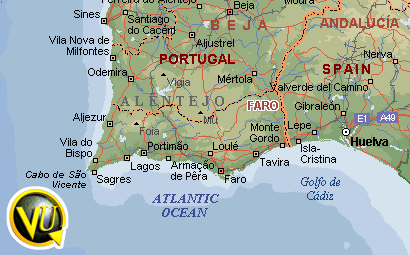
PORTUGAL : Faro
Tuition of 15, 20 or 30 group lessons per week, special Easter course, summer course, private courses, course for foreign Portuguese teachers.
|
Tuition Programs
- 1 lesson: 50 minutes
- Minimum age: 17
- Schedule: from 9 AM to 3:00 PM. depending on the program chosen
- Maximum 6 students per class.
- 20 lessons per week:15 lessons group tuition + 5 private lessons per week.
- If a student will be alone in a class according to his level,
15 lessons will be replaced by 10 lessons group tuition + 5 lessons in lab.
30 lessons will be replaced by 20 lessons group tuition + 10 lessons in lab.
- Easter or summer course: 2 weeks maximum, 12 students maximum per class, beginner to intermediate levels only, 15 lessons per week.
- Courses for foreign Portuguese teachers: 2 weeks, 30 lessons per week.
- All levels available
- School materials
- Multi media centre and library.
- Access to Internet and email
- Numbers of excursions available to be paid on the spot
- Test and certificate of linguistic training
|
 |
Starting Dates
Beginners must start on the following dates below. Other levels, each Monday.
| Jan. |
Feb. |
March |
April |
May |
June |
| 5 |
2,16+ |
1,29** |
5 |
3,10+,31* |
- |
| July |
August |
Sept. |
Oct. |
Nov. |
| 5* |
2*,23***,30* |
13+,27 |
- |
2,15+,29 |
* Starting dates for 30 lessons per week.
** Exclusive starting date for Easter course.
*** Exclusive starting date for summer course.
+ Exclusive starting dates for foreign Portuguese teachers course
School closing Dates
| March |
April |
May |
June |
Sept. |
Nov. |
Dec. |
| 24 |
9 |
1 |
10 |
7 |
1 |
1,8,25 |
Available options
- Airport transfer one way, 40.
- Additional day in the family: 18 to be paid on the spot.
- Our prices are available from January 1st to December 31st, 2004.These prices never include the plane ticket.
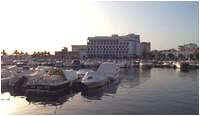
|
Family accommodation.
- Arrival on Sunday.
- Departure on Saturday.
- Single or double * occupancy bedroom, 1 meal per day (breakfast)
* for 2 people coming together
PRICE: 125 per week
Our greeting families are recruited with great care. The criteria of selection are very rigorous and each family must satisfy a precise schedule of conditions: excellent morality, desire to communicate with their host, satisfactory social standing. We should specify that the families will only speak with you the language of the country where you will be. It is the principle of the immersion courses!
|
City information
Weather forecast
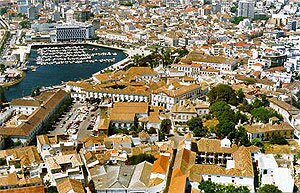 Faro is the administrative center for the whole of the Algarve region with a population in excess of 40.000 thousand people. The city has both Arab and Roman ruins but most of the present attractive older buildings were constructed after the disastrous earthquake of 1755 and the earlier one of 1532. The Moors who occupied the place in the 8th Century originally gave to it the name of Ossσnoba and developed it into a trading port until 1249 when they were defeated by the forces of Dom Afonso III. With the decline of the importance of the City of Silves this town took over the role of administration of the Algarve area. The Earl of Essex sacked this town in 1596 with his fellow crusaders on their journey to the Holy Land and the collection of books taken from the palace of the Bishop of Faro became part of the Bodlean Library in Oxford, England. Another interesting item is that during the 500 years of Moorish occupation there were some Jewish inhabitants in Faro who were busily printing copies of the Old Testament Faro is the administrative center for the whole of the Algarve region with a population in excess of 40.000 thousand people. The city has both Arab and Roman ruins but most of the present attractive older buildings were constructed after the disastrous earthquake of 1755 and the earlier one of 1532. The Moors who occupied the place in the 8th Century originally gave to it the name of Ossσnoba and developed it into a trading port until 1249 when they were defeated by the forces of Dom Afonso III. With the decline of the importance of the City of Silves this town took over the role of administration of the Algarve area. The Earl of Essex sacked this town in 1596 with his fellow crusaders on their journey to the Holy Land and the collection of books taken from the palace of the Bishop of Faro became part of the Bodlean Library in Oxford, England. Another interesting item is that during the 500 years of Moorish occupation there were some Jewish inhabitants in Faro who were busily printing copies of the Old Testament
Particularly attractive is the old part of the city surrounded still by the Roman walls. Inside a spacious open square that once was the site of the Roman Forum is a 13th Century Cathedral that faces the 18th Century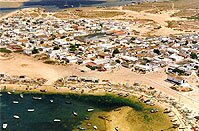 Episcopal palace. An interesting building is the neighboring 16th Century Convent that is now turned into the home of the citys archaeological museum. Within it is a section devoted to the Arab occupation. The golden church of Nosso Senhora do Carmo is claimed to be the best example of gold-leaf woodwork in southern Portugal. It is also contains the macabre spectacle of a chapel lined with the bones from over 1.200 monks! Next to the small boat basin bordering the Praηa de Dom Francisco Gomes is a Naval Museum composed of scale model boats and galleons showing the maritime history of the coast. Much of the city is now composed of apartments and there are many attractive shops and a particularly artistic theatre. Faro is also the home of the Ria Formosa lagoon, a nature reserve of over 17.000 hectares and a stopping place for hundreds of different birds during the spring and autumn migratory periods. The beach is almost 7 kms distant from the city and is a long sandy spit reached by crossing a bridge not far from the International Airport. The municipal council has an active cultural department organizing different and various events during the year. Episcopal palace. An interesting building is the neighboring 16th Century Convent that is now turned into the home of the citys archaeological museum. Within it is a section devoted to the Arab occupation. The golden church of Nosso Senhora do Carmo is claimed to be the best example of gold-leaf woodwork in southern Portugal. It is also contains the macabre spectacle of a chapel lined with the bones from over 1.200 monks! Next to the small boat basin bordering the Praηa de Dom Francisco Gomes is a Naval Museum composed of scale model boats and galleons showing the maritime history of the coast. Much of the city is now composed of apartments and there are many attractive shops and a particularly artistic theatre. Faro is also the home of the Ria Formosa lagoon, a nature reserve of over 17.000 hectares and a stopping place for hundreds of different birds during the spring and autumn migratory periods. The beach is almost 7 kms distant from the city and is a long sandy spit reached by crossing a bridge not far from the International Airport. The municipal council has an active cultural department organizing different and various events during the year.
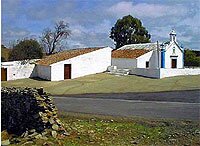 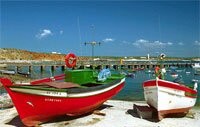 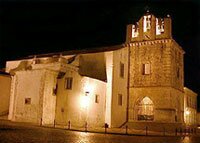
|

